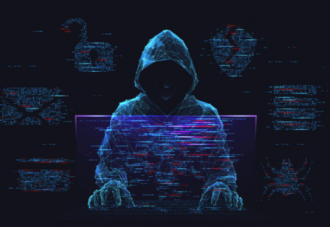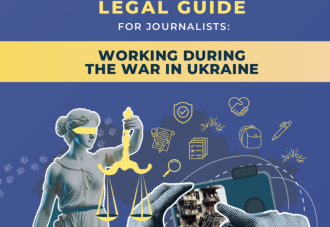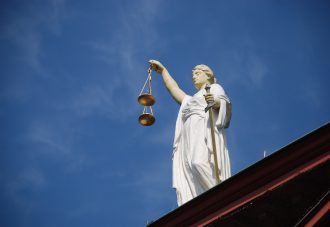The Russian Federation started a large-scale international armed conflict in Europe. Disinformation, special information operations, cultural influence operations, as well as mass murder, rape, violence, robberies, vandalism, and a whole range of other crimes, entail a challenge to the entire system of human rights protection that has taken so much time and effort to build in the world since World War II. For Ukraine, this war is the first one since its declaration of independence in 1991. And while Russia has already taken an active part in a gory Chechen war, a war against sovereign Georgia, and a war against its own people, Ukraine is forced to learn ways to respond to military challenges on the fly. At the same time, the civilized world has also faced propaganda and information aggression unprecedented to this day, caused in particular by the rapid development of technology. It is the technology that has accelerated the spread and penetration of disinformation many times compared to the classic TV, radio or press.
War is a challenge not only to national security, but also to human rights. For the benefit of all citizens, they can be restricted in a conflict period. But how do we know what is the reasonable limit of such restrictions?
Derogations from obligations under international conventions
Following the full-scale Russian invasion, Ukraine has officially derogated from its obligations under the European Convention on Human Rights and the International Covenant on Civil and Political Rights. In particular, the derogation empowers the state to impose additional military service obligations, restrictions on the right to privacy, freedom of religion and expression, the right to peaceful assembly, the right to an effective remedy, property rights, the right to education and freedom of movement. Therefore, Ukraine can temporarily stop fulfilling some obligations and this will not constitute a violation of international treaties.
Derogation from obligations, according to the case law of the European Court of Human Rights (ECtHR), is at the discretion of the state. However, as stated in Ireland v the United Kingdom, measures taken by the state must be reasonable and necessary in the particular situation. It is also for the state to assess whether ordinary laws (other than those applicable only during a state of emergency or martial law) are capable of protecting a legitimate interest (Lawless v Ireland (no 3), §36). If such laws are sufficient, additional restrictions would violate rights and be contrary to international obligations. Moreover, the appropriateness of measures must be justified on a case-by-case basis – it is not enough to merely provide a general explanation for restrictions, it is also required to prove their necessity and proportionality in individual cases (Alparslan Altan v Turkey, §146).
Consequently, in Ukraine, the duration of derogation is set until the end of the martial law. Ukraine’s decision to apply specific restrictions will be relevant if, during or after the war, citizens challenge the authorities’ actions before the ECtHR.
Recommendations regarding derogations from obligations under international conventions
The Verkhovna Rada of Ukraine should:
- Initiate a review of the scope of restrictions on rights subject to the hostilities’ localization, dynamics change and intensity.
- Take into account the difference in administration needs of the occupied territories, gray zones and territories controlled by Ukraine when reviewing the scope of human rights restrictions under martial law.
- Keep in mind the ban on derogations from international humanitarian law.
Executive bodies should:
- Keep in mind that the derogation is not an opportunity to arbitrarily violate fundamental human rights, as this tool does not provide carte blanche for the state arbitrariness, but only allows for the necessary additional restrictions on rights to protect national interests.
- Adhere to the principles of necessity and proportionality in any restriction of rights, and take into account the context of each case, if necessary with the involvement of experts, including civil society representatives, assessing the appropriateness and relevance of restrictions.
Citizens and human rights activists should:
- Carry out regular monitoring of human rights restrictions, assessing the necessity and proportionality of such restrictions, properly alerting state authorities to the existing violations or irrelevance of restrictions.
- Record cases of excessive or disproportionate restrictions on human rights and attempts to abuse state discretion in order to further challenge them in courts to avoid misuse of the derogations (in particular regarding restrictions on non-derogable rights, such as the right to a fair trial, prohibition of torture and slavery, etc.). They should also report such cases to the relevant international human rights mechanisms (e.g., the CoE Commissioner for Human Rights, the UN Special Rapporteurs on Freedom of Expression, on Freedom of Peaceful Assembly and Association, the Human Rights Committee etc) in order to elicit their advice and recommendations to the government.
Freedom of expression during martial law
The aggressor state uses information as a weapon against Ukraine, resorting to propaganda, disinformation campaigns, manipulation and dissemination of illegal calls for war, discrimination and violence. Such actions require an adequate response from the state, but they should not serve as grounds for oppressing freedom of expression, widespread censorship, or stifling opposition voices. This situation evidences the urgent need to reconsider the paradigm of freedom of speech and its restrictions: the Russian invasion once again demonstrates that the system established in the twentieth century is not fit to counter information as an instrument of war. That is why an appropriate mechanism for responding to information aggression should be developed both in law and in practice.
In times of war, the balance between freedom of expression and the desire of the state to protect national and information security naturally shifts towards the state interest. However, the restrictions imposed during such a calibration of interests must remain lawful, pursue a legitimate aim and be necessary for a specific period. In response to the russian aggression, a number of laws were passed in Ukraine that restrict the dissemination of russian symbols, prohibit information support for and endorsement of armed aggression, restrict the dissemination of information on the movement of Ukrainian military and equipment. A special “united marathon” format has also been established for the audiovisual media, which provides for the 24/7 broadcasting of unified information-focused messages by channels, which resulted in several channels being switched off from digital broadcasting on the basis of alleged non-compliance with the requirements restrictions. In addition, a significant list of russian websites that could threaten national security or promote aggression against Ukraine has been added to the list of blocked resources.
Recommendations regarding restrictions on the freedom of expression during martial law
The Verkhovna Rada of Ukraine should:
- Legislate in consultation with relevant stakeholders the grounds and conditions under which additional restrictions on freedom of expression in wartime are possible, in particular, by providing in advance a list of prohibited content that will supplement the peacetime requirements, and appropriate sanctions for its dissemination.
- Detail and properly delineate the powers of state authorities responsible for imposing additional restrictions on freedom of expression (National Security and Defense Council, National Council on Television and Radio Broadcasting, Ministry of Culture and Information Policy, National Commission on Electronic Communications, etc.) during martial law.
- Consolidate the introduction of “crisis protocols” that will allow the executive authorities to take planned measures to impose restrictions on freedom of expression in the first hours after the introduction of martial law, as well as a special regime for the media (suspension of licenses in the occupied territories, interaction with the regulator, etc.).
The National Council on Television and Radio Broadcasting of Ukraine should:
- Create a unified resource that lists all current restrictions on freedom of expression imposed during martial law to facilitate the work of small media outlets that may have difficulties interpreting certain innovations.
- Prior to the adoption of the relevant legislation, develop its own approach to the suspension of broadcasting licenses of entities in the occupied territories which are forced by coercion and threats to disseminate information that violates national legislation of Ukraine, as well as a simplified procedure for their further renewal after the deoccupation of the territory without the re-payment of the license fee.
- Communicate and consult with social media and other platforms, explaining the specifics of Ukraine’s information environment and helping to adapt content moderation policies to the realities of the armed conflict, as well as respond quickly to crisis situations, such as removing data from resources that may record instances of war crimes or crimes against humanity.
The Ministry of Foreign Affairs of Ukraine should:
- Initiate a dialogue at the international level to revise approaches to regulating freedom of expression in light of the increasing threats posed by disinformation – namely the spread of war propaganda and hate speech.
The National Security and Defense Council of Ukraine (NSDC) should:
- Use only existing legislative tools to restrict freedom of expression.
- Review their own decisions for their relevance, in particular the decision to broadcast a united marathon, which led to significant restrictions in the media market.
- Develop special “crisis protocols” that will be used in the event of an armed conflict and will contain an algorithm for consolidating efforts in the information environment to counter armed aggression, and launch their implementation by the bodies responsible for regulating the information sphere.
Media outlets should:
- Comply with legal requirements and journalistic standards regardless of the imposition of a state of emergency or martial law: a special legal regime does not justify violations of journalistic ethics or legislation.
- Ask specialists for additional interpretation of the law if there are doubts about the appropriateness of covering certain events, the correct wording or punishment of certain acts.
- Communicate with government agencies and human rights defenders to identify excessive or irrelevant restrictions on freedom of expression, including legislative changes to such restrictions.
- Explain the peculiarities of the national context to their foreign partners by informing foreign audiences about key events, adjusting one-sided coverage of events by foreign media, building a dialogue with foreign actors to strengthen Ukraine’s position in the media field.
- In case of illegal blocking and removal of comments, posts or accounts by social media or other platforms, contact the platforms directly, helping the moderators to adapt to the military realities.
Human rights activists should:
- Objectively and impartially analyze the necessity and proportionality of restrictions on freedom of expression, helping to adapt restrictions to current realities and alerting decision-makers to the loss of relevance or disproportion as compared to specific circumstances.
- Assist the media to improve coverage of armed conflict and legal issues by explaining legal terminology and correcting cases of misuse.
- Collaborate with social media and other platforms to improve their awareness in local and regional contexts, their ability to store evidence of international crimes, and their ability to effectively counteract the dissemination of harmful and dangerous information related to the conflict.
The right to privacy in the times of war
The war in Ukraine has dramatically changed the perception of citizens’ right to privacy. On the one hand, there has been an increased focus on personal privacy: protecting personal devices, the right to an image, the confidentiality of correspondence, and in general the identity of each individual. At the same time, the legal regime of martial law provides for the possibility of restrictions on privacy as well. This is necessary to identify the occupying forces, facilitate transactions, simplify access to documents, etc.
Thus, the Verkhovna Rada of Ukraine adopted amendments to the Criminal Code of Ukraine, expanding the rights for law enforcement officers to access devices, as well as a large amount of personal data of citizens. In addition, during the martial law, the issue of privacy of prisoners of war becomes especially relevant, as the issue of their illegal coverage in the media has been repeatedly raised. After all, the war has intensified the widespread use of artificial intelligence technology, which requires detailed analysis and evaluation of the impact on the privacy of individuals. Many government initiatives involving frequent processing of personal data have also emerged – in particular, this is related to the expansion of the functionality of government applications (e.g., “Diia”).
Recommendations regarding restrictions on the right to privacy during martial law
The Verkhovna Rada of Ukraine should:
- Provide for safeguards to prevent abuse of access by investigators and prosecutors to citizens’ devices without obtaining court permission.
- Limit the discretion of law enforcement agencies to inspect citizens’ devices during martial law in order to avoid possible interference with the confidential information as lawyers’, medical or other secrets.
- Establish a clear legal framework for the use of artificial intelligence with a preliminary human rights impact assessment (in particular, the rules for deleting personal data after wartime, the possibility of appealing against system’s decisions, etc.). The legal framework shall be developed in consultation with human rights experts, activists and representatives of communities likely to be affected, in particular from vulnerable groups.
- Regulate artificial intelligence systems used to identify persons – facial recognition, authentication of documents, etc., as well as the status of information obtained through the use of such technologies for limiting human rights (detention or arrest or evidence in court proceedings, etc.).
Law enforcement agencies should:
- Carry out explanatory trainings with personnel on cases when a device inspection may be carried out by law enforcement or military personnel for the purpose of finding images and video recordings of restricted facilities and locations, which locations it concerns and how such inspection should be carried out (in particular, without taking the devices into their hands, without seizing the devices, etc.).
- Not use the results of artificial intelligence systems as the sole basis for arresting, detaining or prosecuting individuals.
- Always ensure a review of the AI system results in cases where there is a match with the databases of wanted or missing persons.
The Ministry of Digital Transformation of Ukraine should:
- Develop transparent technical standards for artificial intelligence technologies that can be used in Ukraine during martial law, the procedure for engaging foreign technologies for government needs and ways to implement them.
- Facilitate the dissemination of information on digital security and digital skills, especially for vulnerable users (citizens of the occupied territories, military personnel)
Authorized state authorities and media outlets should:
- Consider the following criteria when publishing POW data: the purpose of disseminating such information (for example, to tell the world about war crimes), the prisoner’s consent (otherwise, the face, name and other personal data must be concealed) and humane treatment (it is forbidden to cover prisoners of war in a derogatory light).
- Take into account the need for enhanced protection of the privacy of members of the armed forces and citizens in general when covering war-related topics in their information resources.
Citizens should:
- Be careful about the protection of their personal data and those of others and should not provide excessive amounts of personal data in non-state applications, surveys, etc.
Sanctions as a tool to restrict human rights
Following the Russian invasion of Ukraine in 2015, Ukraine began to impose restrictions on Russian media, their owners, and later on social media and other entities that produce or distribute information products. At the same time, Ukraine has been repeatedly criticized for imposing extensive sanctions. Although some of these criticisms have been insufficiently substantiated due to a lack of understanding of the national legal and regulatory framework, the issues of legality, proportionality and expediency have remained open for a long time. The lack of sanctions on Russian channels in Europe, unfortunately, allowed them to actively continue broadcasting and implement plans to disseminate their own narratives, which undermined Ukraine’s credibility as a partner. Only the most odious of them were subjected to various sanctions, which made it impossible for them to continue working in some states, after the decisions by their neighbors in the Eastern European region and the British Ofcom. However, the reaction to the violations by the Russian media and their destructive influence was significantly delayed.
Recommendations regarding the application of sanctions
The Verkhovna Rada of Ukraine should:
- Update the sanctions legislation, making it more transparent and predictable regarding the possibility of applying certain types of sanctions to the information resources of the aggressor state.
- Consider the possibility of introducing additional grounds for sanctions in the information sphere, in particular the dissemination of calls for aggressive war and its propaganda, as well as calls for genocide or other international crimes.
- Introduce an effective and differentiated mechanism for appealing against inclusion in the sanctions list, taking into account the public danger of activities that have become the basis for imposing sanctions.
The state authorities in charge of submitting proposals for the imposition of sanctions should:
- Comply with the requirements of legality, necessity and proportionality when exercising discretion over sanctions proposals.
- Initiate a periodic review of sanctions after a certain period of time has elapsed since they were imposed in order to assess their effectiveness.
- Communicate the adopted sanctions to the public and, if necessary, to the international partners in terms of their nature and validity.
- Bear in mind that the abuse of sanctions by appealing solely to their effectiveness may lead to censorship by putting political opponents, rather than hostile entities, on the sanctions lists.
The Ministry of Foreign Affairs of Ukraine and the Ministry of Culture and Information Policy of Ukraine should:
- Initiate a dialogue at the international level to develop common approaches to the imposition of sanctions and promote the consolidation of international efforts to combat information aggression.
The National Security and Defense Council of Ukraine should:
- Assess the impact on freedom of information when imposing sanctions in the media sphere in consultation with human rights experts, activists and representatives of communities likely to be affected, in particular from vulnerable groups.
- Conduct and publish the results of monitoring the effectiveness of sanctions imposed against the information resources of the aggressor state in 2017-2022.
- Based on the results of such monitoring, adjust their scope taking into account the principles of necessity and proportionality.
Centre for Democracy and Rule of Law
Digital Security Lab Ukraine
NGO Detector Media
NGO Institute of Mass Information
NGO Ukrainian Media and Communication Institute



